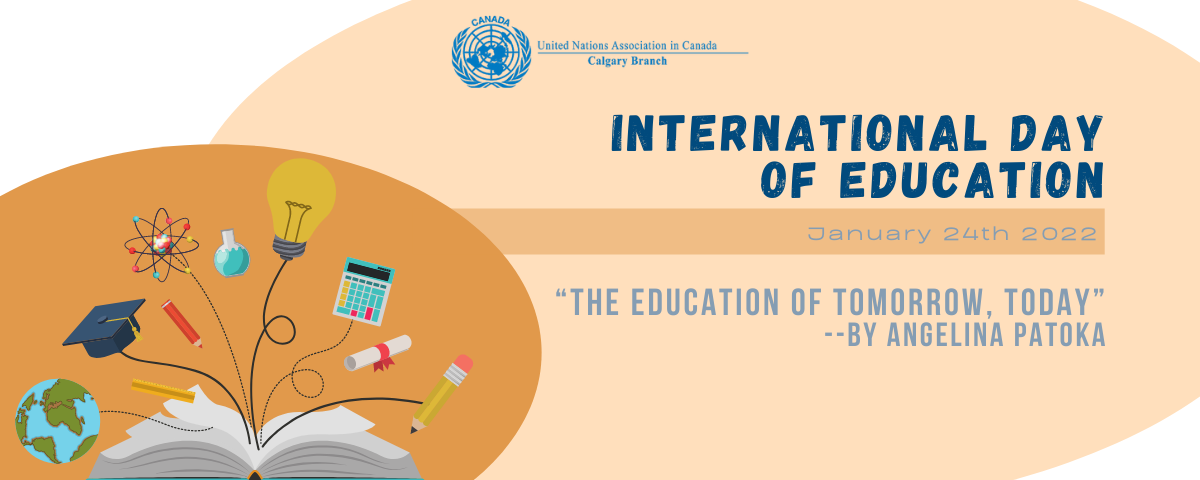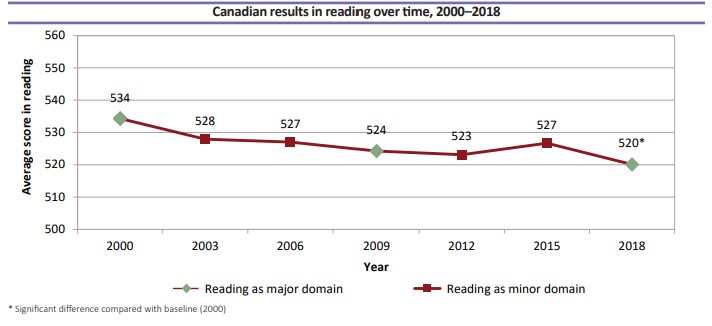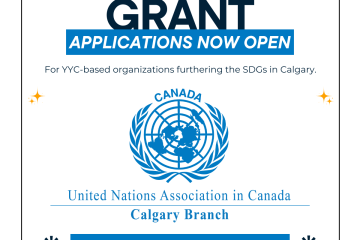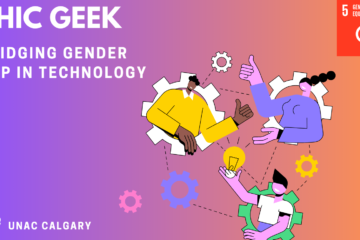
By: Angelina Patoka
The futurists’ optimism was never limited to flying cars and robot doctors. Wonderment and excitement about an idyllic future where the usage of technology as a daily medium of learning across all levels of education was perceived as innovative and progressive in books and articles from less than a decade ago.
Instead, 2022 marks the second year of remote schooling in Alberta amid a world that is continually struggling with a pandemic. Any mention of computing as it relates to education elicits frustrated and resigned responses about the inevitability of constant adaptation and alienation which drastically differs from pre-pandemic sentiments. However, inevitable challenges within the Canadian education systems began much earlier. This blog post will briefly discuss three of them: literacy and numeracy, demographics, and the environment.
Canada and the world
Despite ranking high on the list of earned credentials among member states of the Organization for Economic Cooperation and Development (OECD), Canadians ranked in the lowest tier for performance in literacy and numeracy skills.
In fact, a 2021 OECD report shows that between 2000 and 2018 Canada’s average literacy achievements among fifteen-year-olds declined by fourteen points in the original Programme for International Student Assessment (PISA) scale.
Although literacy got better with age and with increased education, the comparative decline was still present. In other

In Canada, as well as on average across the OECD countries, reading performance declined between 2000 and 2018. Source: Measuring up: Canadian Results of the OECD PISA 2018 Study
words, even though we are a leading state in terms of secondary and post-secondary graduates, reports by the OECD and by NGOs like the Council of Canadian Academies (CCA) indicate high rates of functional illiteracy, including STEM illiteracy, and inadequate numeracy skills among Canadians.
These issues were cited in federal and some provincial documents as early as the 1990s and judging by contemporary critiques any attempts to address them, for example through changes in curriculums, yielded mixed results.
Aging demographics, education and immigration
The next challenge in Canadian education is demographics.
Challenges relative to demographics are tenfold so this blog post will limit its scope to two interconnected ones: Canada’s ageing population and its consistently growing population of immigrants.
As more Canadians retire there is greater demand for skilled and educated workers yet reports and research show that Canada does not lack in skills nor in formal education. Furthermore, fast-paced changes in technology and multifaceted innovations, as well as the need to constantly adapt, sheds uncertainty over what experience ought to be required from students.
Especially in settings where remote working conditions and in-person conditions present unprecedented risks and struggles. Such demographic problems are further aggravated insofar as immigrants are concerned.
Immigrating to Canada is defined by the government’s intention to prioritize highly skilled, highly educated, and healthy individuals. However, despite such demands Canada is notoriously underusing its skilled and educated immigrant workforce.
According to a study by Statistics Canada, over one-half of immigrants with a university degree in STEM had non-STEM jobs and only twenty per cent of those immigrants had positions that required a university degree.
Given Canada’s decentralized education system, upgrading one’s position to fit domestic standards may sometimes require completing the same degree in a Canadian institution which could get very expensive and time-consuming. Even then, immigrants face a significant pay gap that is arguably nonexistent in the United States according to the same study.
Such realities break the illusion of how Canadian education is more accessible compared to other Western countries or that its attainability coalesces with pan-Canadian equity.
Education and the environment
Another challenge for Canadian education is environmentalism. Greater energy demands, urban development in risk-prone areas like flood zones, extreme weather, and pollutants that increase medical vulnerability to viruses like COVID are just a few issues among many.
Calgary is a proper example of an epicentre where multiple environmental issues intersect.
For instance, the province experienced record high energy consumption since the pandemic began. The Alberta Electric System Operator (AESO) declared several Energy Emergency Alerts throughout 2021 alone as it urged Albertans to conserve energy.
As Calgary experienced the closure of schools during the 2013 Alberta floods and during the ongoing COVID pandemic; increased energy consumption could escalate energy failure risks that may result in mass inaccessibility to present-day remote education. Though even in-person education could present unique challenges to Canadian students as extreme weather becomes more prevalent amidst climate change.
The global challenge
As UNAC–Calgary celebrates the International Day of Education and its connection to Goal 4: Education, we recognize how these education challenges are not unique to Canada. Global conditions inevitably affect the 2030 Agenda and otherwise long-term objectives of the Sustainable Development Goals.
Many countries struggle with literacy and numeracy problems. In fact, more than half of all children and adolescents worldwide are not meeting the minimum proficiency standards in reading and mathematics.
Furthermore, the United Nations reports discovered an additional nine per cent of children in grades 1-8 worldwide fell below the minimum reading proficiency levels in 2020. Second, numerous mid- and high-income countries experience large ageing populations and rely on immigration to sustain viable educated workforces, which entails debates over how it may be perpetuating poverty rather than counteracting it. Lastly, environmental challenges including climate change are actively affecting everyone’s education even when it is not as straightforward as natural disasters linked to extreme weather.
Such parallels ought to alarm us. Access to education remains a privilege in Canada just as it is in non-Western countries with ‘lesser’ education systems. Considering the issues, even basic accessibility to Canadian education could become more difficult. Basics that are declared as commonplace problems in numerous non-Western countries.
Whether pandemic era educational frameworks will further contribute to long-term decline in literacy and an increase in dropout rates in Canada is currently inconclusive, but we ought to take note of findings and reports made by global governance organizations and institutes.
It would be a self-disservice to overlook how problems that are (stereo)typically associated with the so-called ‘Global South’ could creep into Canadian education systems. Albeit in unexpected and perhaps more technologically ‘advanced’ ways. For example, the World Bank’s recent reports on how the pandemic affected 1.6 billion students suggest the availability of technology is a necessary but equally insufficient condition for effective remote learning as the most successful education tends to be more human intensive and collaborative.
Be it inaccessibility, demographic uncertainties, or environmental predicaments, the emerging picture of the future of education in Canada indicates micro and macro solutions on local and national levels will be most effective when complimented by macro solutions on a global level because ultimately, we face similar problems with differing circumstances.
How does the education of tomorrow look like today? Perhaps this is subjective despite everything in this post. In that case I must say, I am not utterly enthusiastic about more computer time and robot teachers.
———————————————————
Angelina Patoka is an University of Calgary undergraduate student in her fourth year of her combined political science and international relations degree. She is interested in all aspects of global governance, particularly security issues stemming from international conflicts and disagreements. Angelina began volunteering with UNAC Calgary in late 2020 and she is excited to share and discuss how Canada is affected by ever-evolving globalism.
References and sources
- Some Assembly Required: Stem Skills and Canada’s Economic Productivity by the Council of Canadian Academies. 2018. https://cca-reports.ca/wp-content/uploads/2018/10/stemfullreporten.pdf.
- UNSDG Policy Brief: Education during COVID-19 and Beyond by the UN. 2020. https://unsdg.un.org/resources/policy-brief-education-during-covid-19-and-beyond (website), https://www.un.org/development/desa/dspd/wp-content/uploads/sites/22/2020/08/sg_policy_brief_covid-19_and_education_august_2020.pdf (pdf).
- COVID-19: Students face $17 trillion loss in lifetime earnings by the UN. 2021. https://news.un.org/en/story/2021/12/1107282.
- The Future of Education is Here by the UN. https://www.un.org/en/coronavirus/future-education-here.
- The Future of Education by UNESCO. https://mgiep.unesco.org/article/the-future-of-education.
- Remote Learning During COVID-19: Lessons from Today, Principles for Tomorrow by the World Bank. https://www.worldbank.org/en/topic/edutech/brief/how-countries-are-using-edtech-to-support-remote-learning-during-the-covid-19-pandemic.
- A Canada–U.S. Comparison of the Economic Outcomes of STEM Immigrants by Statistics Canada. 2020. https://www150.statcan.gc.ca/n1/en/catalogue/11F0019M2020016 (official), https://www150.statcan.gc.ca/n1/pub/11f0019m/11f0019m2020016-eng.htm
- Challenges of Canada’s Decentralized Education System by David Waddington. 2018. https://files.eric.ed.gov/fulltext/EJ1180308.pdf.
- Albertans asked to conserve energy during extreme cold snap by Emily Mertz. 2021. https://globalnews.ca/news/8476587/alberta-cold-weather-conserve-energy-aeso/.
- Section 305.1 – Energy Emergency Alerts by AESO. https://www.aeso.ca/rules-standards-and-tariff/iso-rules/section-305-1-energy-emergency-alerts/.
- Coronavirus, Climate Change, and the Environment A Conversation on COVID-19 with Dr. Aaron Bernstein, Director of Harvard Chan C-CHANGE. https://www.hsph.harvard.edu/c-change/subtopics/coronavirus-and-climate-change/.
- OECD Skills Outlook 2021: Canada by the OECD. https://www.oecd.org/canada/Skills-Outlook-Canada-EN.pdf.
- University graduates with lower levels of literacy and numeracy skills by the Government of Canada. (this is from the archives, last modified in 2015, but it was good for cross references), https://www150.statcan.gc.ca/n1/pub/75-006-x/2014001/article/14094-eng.htm.
- Goal 4 profile by the UN. https://sdgs.un.org/goals/goal4.
- Global Education Coalition by UNESCO. (homepage). https://en.unesco.org/covid19/educationresponse/globalcoalition#.
- Points of Prejudice: Education-Based Discrimination in Canada’s Immigration System by Stuart Tannock. 2011. https://onlinelibrary-wiley-com.ezproxy.lib.ucalgary.ca/doi/full/10.1111/j.1467-8330.2010.00864.x.


